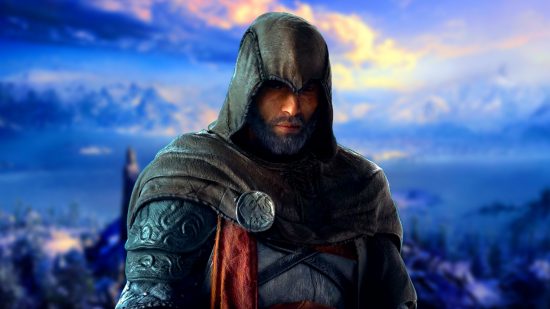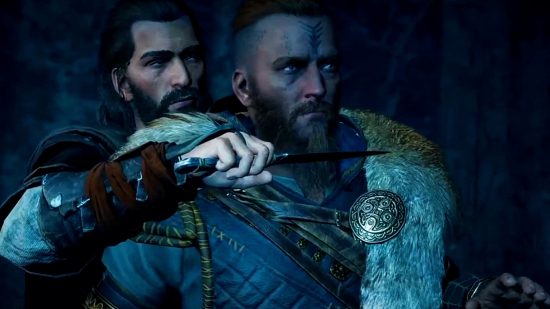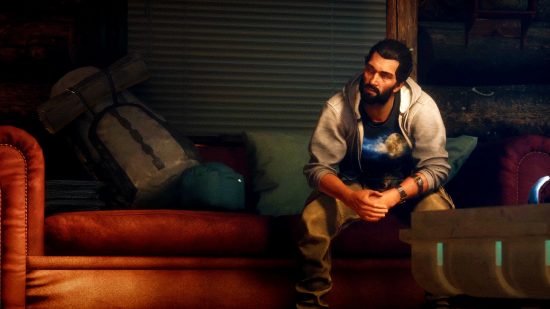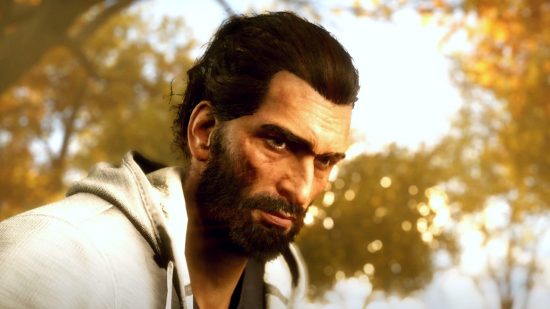I know it’s been quite a while since the most recent Assassin’s Creed game was released (and I know that a lot of you have mixed feelings about Eivor and her narrative) but, I think we can all agree that Basim Ibn Ishaq is a fantastic character. In fact, he might just be one of the best secondary characters in the Assassin’s Creed series to date. He’s certainly the best character to come out of Assassin’s Creed Valhalla – even though we all love Ceolbert. However, his husky voice and magnificent beard isn’t the only reason why I think he deserves to be the sole focus of the next Assassin’s Creed game. There are a few more important reasons as to why I think Ubisoft desperately needs to make Basim the next protagonist in Assassin’s Creed.
Before we continue any further, I want to make it clear that there will be spoilers for the Assassin’s Creed Valhalla narrative below. If you’re still dealing with trouble in Jorvik or brushing shoulders with Stowe in Lunden, you may want to skip the next couple of paragraphs. You can read about why an Aztec Assassin’s Creed game makes perfect sense here, though (and trust me, it really does).
Anyway, let’s get back to the topic at hand, shall we? Basim should absolutely be the main character in the next Assassin’s Creed game from Ubisoft – if not the main protagonist for the next trilogy of games – and here’s why.
First things first, Ubisoft can – and should – use Basim to clean up Assassin’s Creed Valhalla’s messy ending. The developer needs to undo some of the damage he has done, narratively speaking, to the Assassin’s Creed universe. It needs to mitigate the chaos he has caused by effectively stealing the Staff of Hermes Trismegistus and basically resurrecting himself after well over 1,000 years of comatose imprisonment in Yggdrasil. What? I said there would be spoilers.
I am well aware that Assassin’s Creed Valhalla isn’t the first game in the series to push a modern day character, such as Layla Hassan or Desmond Miles, into contact with a contemporary character, such as Ezio Auditore or Basim, but Valhalla contains the first iteration of this cross-generational chit-chat where one character effectively tries to murder the other – and it’s the first time that they’re not direct relatives. When you also consider the fact that Basim is then able to get into the Animus and experience Eivor’s memories as if he was her ancestor, the whole absurd situation raises so many more questions than it should.
I know Basim does mention that some sort of bleed effect will come into play, but it still feels like it undermines the precedent that characters like Desmond and Layla are special because they have a greater genealogical connection to these interesting figures who have come into contact with the various Pieces of Eden scattered throughout history. If Basim can just jump into someone else’s Animus and experience everything, why do the Assassins or Abstergo care about who they throw into it in the first place?
It doesn’t really make sense and the ease at which Basim manages to slip into Eivor’s memories in Assassin’s Creed Valhalla suggests that all you need is some amount of DNA from a descendant to access their ancestor’s memories. This issue is something that Ubisoft needs to address in the next Assassin’s Creed game, and what better way to iron out this kink than with the character the developer used to create it. As an integral narrative vessel for the historical stories and adventures that help Assassin’s Creed stand out, we don’t think we’ll see the Animus dropped from this game series anytime soon. So, all of these question marks around its technology need addressing.
But, this isn’t the only reason why Ubisoft should continue to explore Basim’s story with the next Assassin’s Creed game – oh, no. As a character, he has something of a duality and a unique darkness that we haven’t really seen in an Assassin’s Creed protagonist before. Using this could help Ubisoft create a stand-out narrative that delves deeper into the morally grey areas that these games seem to avoid. Even in a game about the Vikings, notoriously violent raiders who pillaged and burned their way through lands like the British Isles and Estonia, Ubisoft unequivocally presents Eivor, the Raven Clan, and the other Vikingr she comes across as the morally just saviours of England – well, apart from a few bad apples, anyway.
As a saving grace, of sorts, Assassin’s Creed Valhalla does offer players some of the most violent combat in the series to date. However, this does little to hide the fact that Ubisosft have largely sugar-coated the Vikings in this game – which is why we need Basim to be front-and-centre and unfiltered when it comes to the next entry in this series.
Despite his role as one of the only Hidden Ones you come across in Assassin’s Creed Valhalla, the group that later come to be known as Assassins, Basim is far from the morally righteous hero you expect him to be after an entire series of games paint members of this group in a near-angelic light of fighting the good fight against corruption and evil. Of course, I know all Assassin’s Creed protagonists are complex individuals, but Basim is easily one of the most morally ambiguous established Assassins we’ve met in the series so far. He always has his own self-interests at heart, which is clear when you compare him to Hytham – the other Hidden One in Assassin’s Creed Valhalla – or other characters like Yusuf Tazim of Assassin’s Creed Revelations. Hell, Edward Kenway is clearly a morally good character and he’s a literal pirate.
When you couple this with the sporadic nature of Loki and the recklessness that this Asgardian half-Jotun brings to the table, you get a character with a quick tongue, a short fuse, and aeons of trauma that’s misunderstood as malice. At the end of Assassin’s Creed Valhalla, we’re left to believe that Basim is the true villain of the story – poisoning Sigurd’s mind with the hopes of finding a direct descendant of Havi to enact revenge against. However, much like other iterations of Loki, Basim is more of a chaotic neutral; he doesn’t serve a greater cause and, despite his interests aligning with Eivor’s on occasion, he doesn’t do things because they’re the right thing to do – not really.
This selfishness makes him quite unlike any other Hidden One or Assassin we have met before – if you don’t count newcomers like Ezio and Arno. It’s something that makes him, in my opinion, the perfect vessel for Ubisoft to continue the narrative. We need an Assassin’s Creed game that explores the nuances between the modern-day iteration of this group and the Templars they’re up against. It is, quite frankly, a confusing mess that Basim is perfectly poised to explore while simultaneously dismantling the notions that permeate the series – the notions that the Assassins are inherently good and that the Templars are inherently evil.
To top it all off, as if this wasn’t enough to sway you that we need Basim leading the next Assassin’s Creed game, Ubisoft could set it pretty-much anywhere it wants and still include him.
Why am I saying that? Well, as we mentioned before, Basim can seamlessly slip into Eivor’s memories in the modern day through a bleed effect, of sorts. With this logic, Basim should be able to slip into anyone’s memories provided he has some trace of their DNA left in an Animus somewhere.
Of course, we don’t quite know how this technology works and whether the ISU genetics the two share have anything to do with it, but it’s an Assassin’s Creed game. It isn’t exactly logical at the best of times, as we have established. So, it doesn’t really matter whether we’ll be taking a trip back to Constantinople, feudal Japan, or anywhere else in human history. Ubisoft can make it work with Basim at the helm – and, it should.
Assassin’s Creed Valhalla is one of the best PS5 RPG games out there – and one of the best Xbox RPG games, of course. But, using Basim to delve deeper into this universe’s lore and the grey area that permeates the space between the Assassins and the Templars could make the next one even better.



